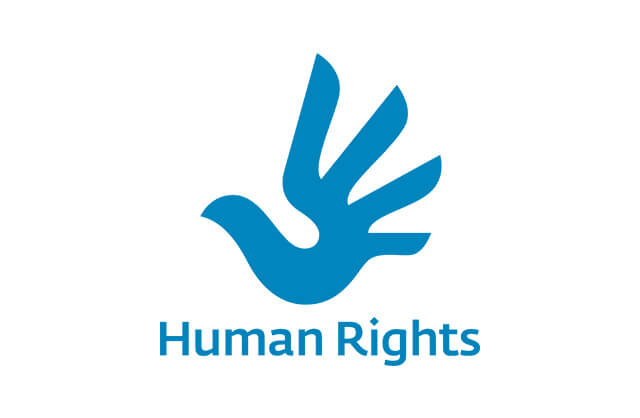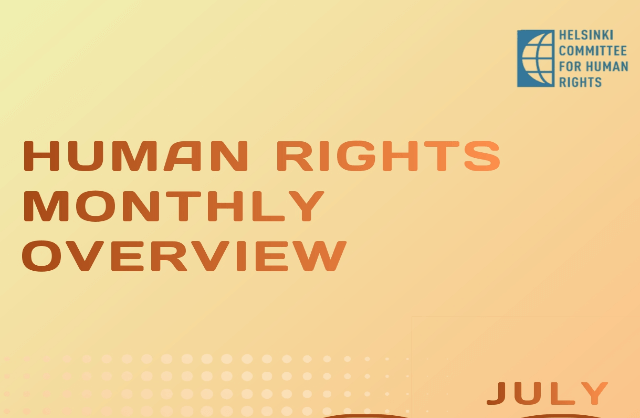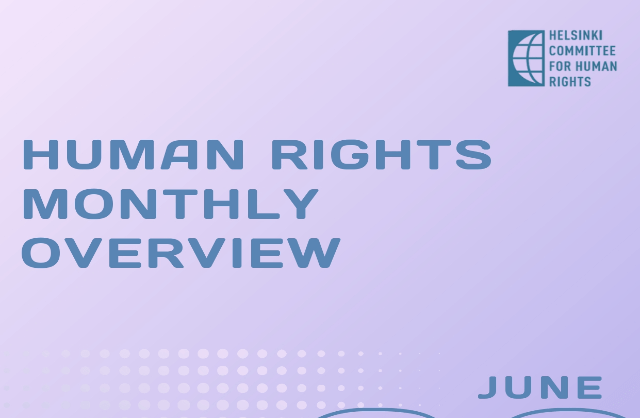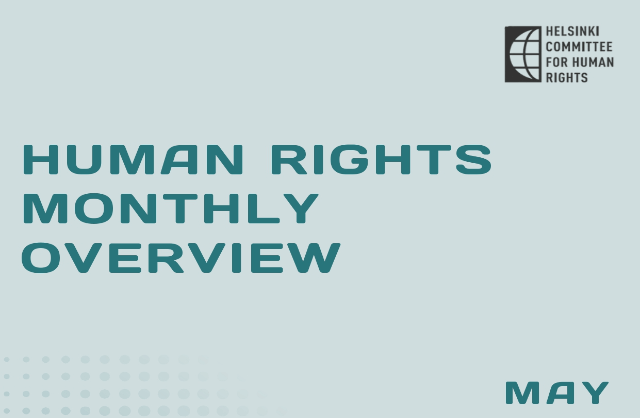Monthly report – September 2015
October 16, 2015

The Monthly report on the human rights situation in the Republic of Macedonia for September 2015 includes the following topics: Ignorant decision of the Primary Court I Skopje;Civil initiative for adoption of Law on Amnesty; Unethical refusal of physicians from the South-east region to treat refugees; Slap in the face administered by police officer amounts to degrading treatment; The case of triple homicide in Kavadarci; and Recommendations to Macedonia concerning violations of the rights of Roma population.
IGNORANT DECISION OF THE PRIMARY COURT I SKOPJE
The Helsinki Committee is startled by the abuse of procedure committed by the judge in charge of the preliminary proceeding who, acting on the motion of the defense attorney Nikola Dodevski, passed a ruling with which he approved of the motion for separation of evidence, more specifically the recordings of telephone conversations and files transcripts submitted to the Primary Public Prosecution, formed after the criminal charges were filed by the SDSM. According to the judge, these evidence should be separated because they were illegally obtained, and therefore cannot be used, neither a court decision may be based upon them. In this case the judge illicitly interfered with the work of the Public Prosecution and made an unlawful ruling which cannot produce a legal consequence, and as such it should be appealed by the Primary Public Prosecution in Skopje, and rejected by the Court of Appeal in Skopje. Namely, the provisions cited by the judge (Law on Criminal Procedure, Article 93 – Separation of Evidence apropos Article 12, paragraph 2 – Lawfulness of Evidence) are applicable only when the case is already in the phase of formal investigation procedure. Taking in consideration the fact that the files were requested from the Prosecution by the Court, it is clear that the Prosecution had not made a decision to initiate investigation procedure, neither demanded adjudication of any kind of verdict. This six-monthly inactivity of the Primary Public Prosecution is yet another indicator of the frivolity of the judicial authorities and gives rise to the suspicion of their possible coordination in the attempt to avoid legal obligations.
Considering that the criminal charges are still in the phase of preliminary proceeding (a vast number of the charged individuals have not yet been questioned), the judge in charge of the preliminary proceeding did not have the authority to act in the part of the procedure which, according to Article 289 of the Law on Criminal Procedure, is considered a secret. The authority of the judge in charge of the preliminary proceeding commences with the beginning of the investigation procedure, while the only exception from this rule is the court control over the lawfulness of the investigation bodies’ activities (Article 290). However, neither the defense attorney’s motion, nor the judge’s ruling have anything to do with unlawful activities of the Prosecution; instead, they are focused on the separation of the evidence, allegedly illegally obtained by a third party. The court is allowed to investigate whether the evidence is obtained legally or illegally only during investigation or court procedure, but not during preliminary proceeding (Article 294, LCP). This is confirmed by the fact that the provision on the basis of which the judge passed the ruling claims that the latter may be passed on suggestion of the involved “litigants”, while the suspects at this phase of the procedure still do not have the status of “litigants”.
Accordingly, the judge neither had the authority to demand the files from the Prosecution, nor to separate and retain the evidence. The intention to make the ruling final and thus take advantage of Article 14 of the Constitution is clearly visible, because according to this Article nobody can be put on trial for an offence for which he had already been tried, and regarding which a final court ruling had been passed.
Acting in this way, the judiciary practically nullifies the political agreement for appointing a Special Public Prosecutor and makes pointless her primary goal – which is to investigate the allegations of severe criminal offences committed by the highest representatives of the Government. Thereby the recommendation for opening negotiations with the EU as well as the rule of law in Macedonia are being seriously endangered.
CIVIL INITIATIVE FOR ADOPTION OF LAW ON AMNESTY
During the month of September commenced the collecting of 10.000 citizens’ signatures in order to instigate civil initiative for adoption of Law on Amnesty. The draft-law envisages exemption from serving 40% of imprisonment sentence for all convicted individuals, full acquittal of individuals who are for the first time sentenced to imprisonment up to six months, exemption from serving 50% of sentence in duration from six to twelve months, and full acquittal of individuals who have reached 75 years of age.
The last Law on Amnesty of individuals convicted in the Republic of Macedonia was adopted in 1999 (“Official Gazette of RM” no. 6/99), that is to say more than 16 years ago. In the Western Balkan region laws on amnesty of the general prison populations were adopted in Serbia (2012), Kosovo, and Montenegro (2013). Depending on the country, those laws refer to exemption from 25% of prison sentence, but are not applicable to certain criminal offences, like severe forms of homicide, production and sale of narcotic drugs, criminal offences related to sexual abuse, organized crime and corruption, as well as criminal offences tackled by the international humanitarian law.
Taking in consideration the long period which has elapsed since the adoption of the last Law on Amnesty, the fact that the prisons are heavily overcrowded, and the violation of the convicted individuals’ basic human rights, the Helsinki Committee voices its support for the adoption of the Law on Amnesty. Nevertheless, we believe that in order for such a Law to enter into force, it is necessary to have a broader public discussion in which all stakeholders must be involved, including government institutions and scientific and civil organizations. The public debate should be organized with the aim to select the most adequate amnesty modality, to evaluate the risks from the possible increase of recidivism, but also to determine the causes which produce overcrowding, inefficient resocialization policies, as well as to improve the conditions under which the imprisonment sentence is being served.
UNETHICAL REFUSAL OF PHYSICIANS FROM THE SOUTH-EAST REGION TO TREAT REFUGEES
During the month of August, 23 out of overall 25 private health clinics located in the municipalities of Gevgelija, Valandovo, Dojran and Bogdanci, used a petition signed by physicians to inform the Health Insurance Fund (HIFM) that they would not follow the order for standby duty in the infirmary for refugees, located on the premises of the Police Station at the Gevgelija Railway Station. The order was filed electronically by the HIFM. In the petition the physicians state that they are not willing to accept the mentioned standby duty in the infirmaries, since they are not under such legal or contractual obligation. According to them, the so-called improvised infirmary is lacking in basic conditions for providing medical service, as well as in medical instruments, operating sanitation supplies, etc. Furthermore, they claim that the doctors are there bereft of material and safety conditions, as well as of prophylactics, and that due to these unfavorable circumstances their and the health of their patients and families may be endangered. According to the health clinics, the public health institutions are the factors which are in position to provide much more wide-ranging health assistance and protection.
The Ministry of Health and the HIFM commented on the petition by claiming that the order for standby duty had been issued with the aim to establish a schedule of standby duties as a preventive measure, and that it refers exclusively to a schedule which is not operationalized and implemented. According to these two institutions, the order is applicable in a hypothetical situation, and would become obligatory only in the case of serious endangerment of the migrants’ and refugees’ health.
The Helsinki Committee would like to remind the public that all medical doctors in the Republic of Macedonia are obligated to act in accordance with the Hippocratic Oath, cast into the Physician’s Oath included in the Geneva Declaration of 1948. According to these oaths, the medical doctors consecrate their lives in the service of humanity, and perform their profession conscientiously and responsibly. In the performance of their duties towards the ill, the doctors must not have any prejudice concerning one’s age, nature of illness or disability, ethnicity, gender, creed, nationality, race, political affinity, sexual orientation or social status. The Committee appeals to the Ministry of Health and the HIFM to secure on the border-crossings adequate conditions for treatment of the refugees who are transiting through the country, including hospital treatment, especially for the vulnerable categories with disabilities.
SLAP IN THE FACE ADMINISTERED BY POLICE OFFICER AMOUNTS TO DEGRADING TREATMENT
By the end of September 2015, the European Court of Human Rights, with its judgement on the case Bouyid against Belgium*, affirmed that the act of slapping carried out by police officer amounts to violation of protection from torture, guaranteed in Article 3 of the European Convention on Human Rights.
This case is about the way two brothers were handled by police officers, who slapped them twice in the Police Station where they were supposed to give a statement. In both cases, the individuals were issued а medical certificate confirming that they had bruises on their faces, caused by a slap.
In the judgment which was passed by the Great Chamber the principles of the European Court of Human Rights were invoked, and it was underlined that an arrested individual is in especially vulnerable situation, as well as that he or she is under control of the competent state authorities which are responsible for his or hers protection. If the detainee is injured during that time, the state is obliged to prove how that injury came about. The Court especially emphasizes that any kind of physical force applied by the police officers, which was not absolutely necessary, violates the human dignity of the arrested individual, and it will be considered that such use of physical force violates the right established in Article 3 of the Convention, even if there was no clear intention to degrade or destabilize the individual. The Court cites the principles established in the case Tyrer against Great Britain** (although that is an instance of “degrading punishment”), where it is ascertained that although the plaintiff did not suffer long-lasting physical consequence, the very fact that the state authorities treated him as an object violates the essence of Article 3, which is human dignity and physical integrity.
This case is of special significance because it establishes three important principles, namely the following: First, the Police must not use illegitimate and excessive force and yield to provocations; second, premeditation is not always a necessary ingredient in the violation of the guaranties given in Article 3; and finally, human dignity and physical integrity must be absolutely respected by the state authorities.
We believe that a ruling such as this is of exceptional importance for the Republic of Macedonia as well, taking in consideration the huge number of complaints and charges regarding excessive use of force and degrading treatment by police officers. The current practice shows that the Prosecution does not investigate cases of torture, especially when the alleged perpetrators are police officers***. Due to these reasons we recommend that the police officers should respect people’s rights regarding prohibition of torture and thus preserve the individual’s physical and moral integrity, while the Prosecution should respect the outlooks and the practices of the European Court of Human Rights and efficiently investigate the charges of torture and degrading treatment effected by police officers.
THE CASE “TRIPLE MURDER IN KAVADARCI”
By the end of 2014 the public learned of the multiple murder of family members of a woman who was a victim of domestic violence. This vicious crime took place in Kavadarci, and was committed by the woman’s former husband, who made use of firearms in the act. In this case as well the competent authorities failed to provide protection to the victim of violence, which was inflicted upon her and upon the members of her family by her former husband.
Prompted by the inefficiency and the negligence of the institutions in this particular case, the Public Prosecution initiated investigation against the police officers and the employees of the Center for Social Work who were in charge of the case. The trial of the police officers is now closed and those individuals are convicted on the charge of professional negligence, due to the fact that they failed to take away from the former husband the firearms, for which he did not hold any special license. The above mentioned individuals were put on probation, such that imprisonment sentence in duration of six months was pronounced, which the defendants would not serve provided they do not commit another criminal act within the time span of one year after the verdict becomes final. The victim was not invited to participate in the proceedings, although she was the aggrieved party in this case of professional negligence of the police officers, and despite the fact that it was her who filed the request to the Police to seize the weapon of the perpetrator, due to the repeated attacks against her as his spouse, as well as against the members of her family. Besides, she was not even informed about the proceedings against the convicts, while she learned about the court decision from the media. Her family members were killed with that weapon. Therefore, the victim suffered losses due to failure to act and negligence of the police officers, who inflicted enormous emotional suffering upon her by omitting to seize the weapon.
On account of the restriction of her right to participate in the proceedings as victim, i.e. aggrieved party, as well as on account of the fact that the police officers should have been prosecuted for more severe criminal offence, the Helsinki Committee provided legal assistance to the victim, so that she could file a Request for Protection of Legality, which was delivered to the Public Prosecutor of the Republic of Macedonia. With this Request, the victim demanded overturning of the above ruling and reinstating of the proceedings, in which she as well would be involved, while the police officers would be prosecuted on the charges of Abuse of Official Capacity and Authority, due to severe violation of the rights of another party. The fact that the victim was not involved in the procedure, which was closed urgently, as well as the fact that the police officers were charged with lesser criminal offence than the one they should have been prosecuted for, give rise to suspicion in the sincerity of the intention of the Public Prosecution and the Courts to determine and penalize the factual responsibility of the police officers.
In his response, the Public Prosecutor of the Republic of Macedonia informed the victim that her Request for Protection of Legality was groundless, considering that there had been no violation of law or international agreement ratified in accordance with the Constitution of the Republic of Macedonia.
From this answer a conclusion may be drawn, which actually confirms the doubts that the Public Prosecution and the Courts failed to determine and penalize the factual responsibility of the police officers. Such behavior on the part of the Public Prosecution of the Republic of Macedonia, in other words the fact that the victim was not involved in the trial of the police officers on charges of failure to act upon the victim’s request to seize the weapon, is nothing but a gross violation of the victims’ rights. Furthermore, this is a confirmation of the fact that the protection of women – victims of domestic violence is highly inefficient.
We believe that it is necessary to include the victims of domestic violence in the court proceedings against police officers that failed to act according to the law, if we want to have efficient protection of the victims of domestic violence. For these reasons, we recommend that in the future the Public Prosecution should carefully consider the fact that the victims suffer losses due to negligent behavior of the authorized persons whose duty is to provide protection in cases of domestic violence.
RECOMMENDATIONS TO MACEDONIA CONCERNING VIOLATIONS OF RIGHTS OF THE ROMA POPULATION
On the 11th and 12th of August 2015, the Committee on the Elimination of Racial Discrimination (CERD) held its 87th session, during which the Interim Report of the Republic of Macedonia on Respecting and Implementing the Rights Guaranteed in the Convention on the Elimination of All Forms of Racial Discrimination was also being reviewed.
The Network for Protection from Discrimination, of which the Helsinki Committee, jointly with the civil association Reaktor – Research in Action, is also a member, submitted to the CERD a Shadow Report. In it were pointed out the problems which that the Roma ethnic community in the Republic of Macedonia is still facing. Especially pertinent are the problems of freedom of movement, school segregation, the social status of the Roma people, unemployment and right to housing, lack of personal documentation, as well as the problems concerning health protection of Roma drug users, but also Roma women. In the submitted Report, the Network also offered recommendations for overcoming the identified problems, which were to a large degree accepted by the Committee, and suggested to the RM in the concluding observations.
According to the concluding observations of the Committee on the Elimination of Racial Discrimination of the United Nations, it is obvious that the state does not manage to improve the situation of the Roma population, as members of the most marginalized ethnic community in the Republic of Macedonia. The Committee points out the limitation of basic freedoms and rights and their ineffective protection, especially in the area of freedom of movement of the Roma population, lack of personal documentation, the situation with Roma children living on the streets, and school segregation.
When it comes to freedom of movement, the Committee points out that it is concerned about the cases of racial profiling of the Roma who want to leave the country, and recommends that the state should fully respect the right of the people to freely leave and return to the country, but also to undertake appropriate measures in order to prevent questioning, as well as arrests on the basis of person’s ethnicity. Concerns regarding this issue were recently expressed by the United Nations Human Rights Committee, which recommended that the state should respect the right of every person to leave any country, including their own. In the area of school segregation of the Roma, the Committee points out that it is concerned about the information that some schools, especially in Bitola, decline to enroll Roma children, then about the self-segregation present among the Roma children, but also about the high percentage of Roma children in the Republic of Macedonian enrolled in special schools. In this regard, the Committee recommends that the state should prevent all discrimination in the area of access to adequate education against the schoolchildren belonging to the Roma ethnic community.
The Committee expresses special concern about the situation regarding Roma children living on the streets, Roma children who are drug users and Roma children who lack personal documents and are unable to procure them on any basis, and recommends that the state should undertake all necessary measures for protection of the rights of those children.
The Committee expresses its concern about the housing of the Roma and about their low social status, concluding that the Roma community is the community most exposed to poverty, unemployment and social exclusion.
On account of all these factors, the Network for Protection from Discrimination, including the Helsinki Committee, appeals to the Government of the Republic of Macedonia to respect the Convention on the Elimination of All Forms of Racial Discrimination, and to undertake urgent measures for implementing the recommendations of the Committee on the Elimination of Racial Discrimination.
* The entire judgement is available on the following link: https://hudoc.echr.coe.int/eng#{“display”:[“0″],”languageisocode”:[“ENG”],”appno”:[“23380/09″],”itemid”:[“001-157670”]}
**The entire judgment is available on the following link: https://hudoc.echr.coe.int/eng?i=001-57587#{“itemid”:[“001-57587”]}
***See the Helsinki Committee Quarterly Report June-August 2015:


